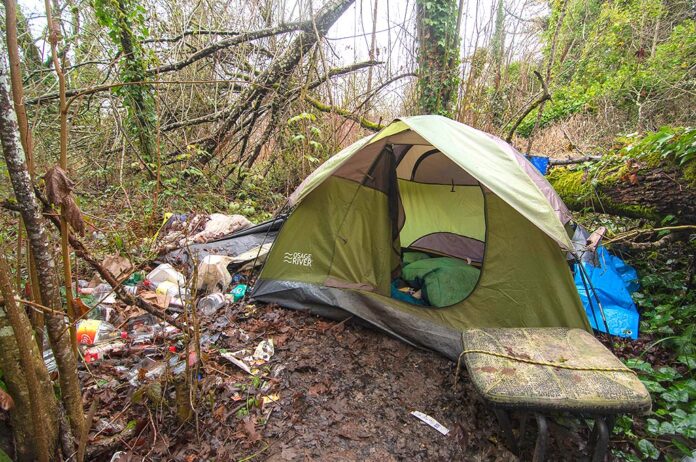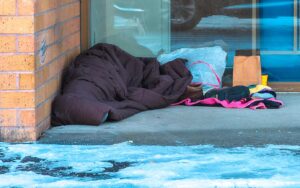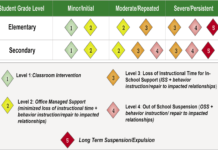
New rules governing camping in Tigard take effect next month, outlining where, when, and how the city’s houseless population can spend the night and what time they must vacate every morning.

The so-called “time, place and manner” ordinance swaps a citywide camping ban for regulation and brings Tigard into compliance with a state law requiring cities to create “reasonably objective” space and hours for overnight sleeping.
“We need to be in compliance with Martin v. Boise (a 2018 Ninth Circuit Court of Appeal ruling) which says a city cannot prohibit camping within the city,” said Kim Ezell, a Tigard strategic initiatives program manager who helped create the regulations.
Camping will be allowed from 7 p.m. to 9 a.m. on city property and most sidewalks, but not in parks or parking lots, and is also permitted in greenspaces but not sidewalks around City Hall, Tigard Public Library, and Public Works facilities.
It’s otherwise allowed on sidewalks throughout the city with a few exceptions, and the camp must leave three feet of passing space open to comply with ADA accessibility laws.
Four downtown streets are off-limits: Southwest Burnham Street, Main Street, Commercial Street and Tigard Street between Main Street and Tideman Avenue.
The ordinance also bans open flames, gas and propane heat.
Oregon HB 3115 requires cities to comply by July 1.
Tigard’s ordinance, Ezell said, is less restrictive than those recently enacted by neighboring cities that have narrower camping windows and name fewer legal places to pitch a tent.
After raising numerous questions about the regulations’ potentially harmful impact on the houseless community, City Council members added a provision to review the ordinance every six months and then unanimously approved it.
Among their biggest concerns were heating restrictions, the impact of moving daily with no place to store belongings during off-limits hours, and the lack of places for houseless individuals who work at night to sleep during the day.
Council heard those concerns echoed and amplified by several houseless community members and two advocates from the Just Compassion houseless shelter who spoke at the meeting.
“Being homeless is exhausting. Literally everything necessary to get through the day takes extra energy. On top of which, an overwhelming feeling of vulnerability prevents good restorative sleep. It’s exhausting. Packing down and setting up daily would be an enormous hardship for people who are already exhausted from the rigors of homelessness,” said James Black.
Black has been houseless since June 2022, after an injury ended his 20-year career, leaving him unable to pay rent.
“I live a sober life. I am mentally stable. But I just can’t afford the inflated rents. Anyone could end up in circumstances that cause homelessness,” he said. “Anyone.”
Another woman, who is pregnant and waiting on pending housing, worried about the physical strain of constant moving.
“I’m pregnant,” Alex Davis said. “I can’t carry stuff on my back from 9 a.m. to 7 p.m. I can’t. I just can’t.”
Youth Councilor Ashika Nag pointed to additional challenges for houseless Tigard students who will be left with hours to kill between the final school bell and the start of camping hours.
“Was there a consideration for youth who have to go to school during (the no camping hours) and have to return to somewhere after,” she asked.
According to Ezell, the current plan assumes those kids can go to the library, which is open until 6 or 8 p.m. depending on the day, or would need to find other available social services.
Shifting daylight hours and changing temperatures from season to season prompted Council to call for revisiting and reviewing the regulations in August and again in February. The idea is to plan early.
Cold was a universal concern.
“How can you justify the ban on propane heaters? What’s the longest you’ve gone without heat in your own homes,” Caleb Peterson asked. “It’s a discomfort we wouldn’t wish upon anyone, yet we are contemplating restricting access to a crucial heat source for people who have nowhere to sleep but outside, even on nights when it gets below freezing.”
Peterson, an advocate from the Just Compassion shelter, called for a shift from regulating and criminalizing houselessness to addressing root causes.
“The focus should be on providing house keys, not handcuffs,” he said.




















